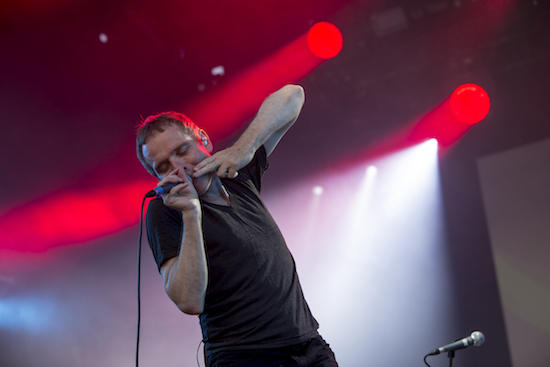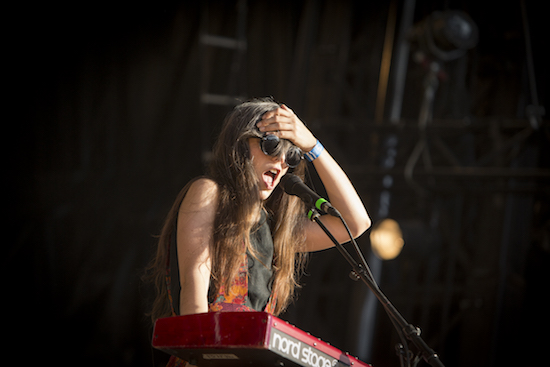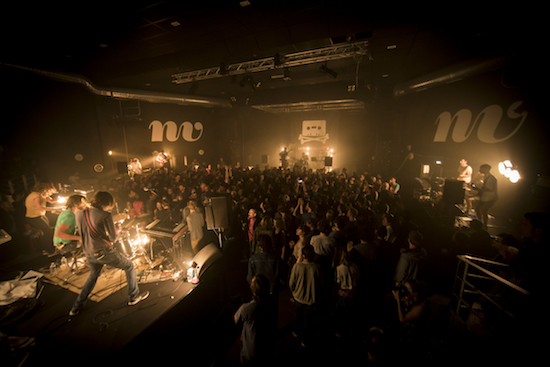La Colonie De Vacances introduce us to live 4.0 surround sound
Past the dispersion of Saint-Malo’s beige suburbs, you find the local La Nouvelle Vague music venue. We only make a visit the once on the Thursday, and here La Colonie De Vacanes are introducing us to their ‘quadrophonic show’, which involves a surprisingly experience-altering variation on the traditional stage setup. The venue’s specification has been manipulated so that four stages enclose the audience from all sides. As opposed to a familiar congregation at the stage fronts, a mosh-pit coils in the hall’s centre. Once in this central point, audience members might find themselves shifting to different sides of the stage to accentuate the synths, or the drums or bass depending on their own preferences. In comparison to traditional gigs, where there is only one stage and you can either stand at the front or back, or left to right, this ‘quadrophonic show’ offers unusual subjectivity. It’s so inventive that it’s hard to imagine it not being used more often. And it’s a concept that La Colonie De Vacances – a band you could bracket with the UK’s Blood Sport or Golden Teacher, revisiting the percussion fascinations of Liquid Liquid and the New York no-wave – pull off without error
Indie pop is good wallpaper music for the beach (and this is no insult)
Brittany is not a mirror image of Portsmouth harbour, with its dirty, off-white stacked houses and seedy overtones. When finally in summer light, Saint-Malo’s elaborately moulded carousels and florid pink unicorn-themed cafes are Fantasia-like. And although, with its enclosing ramparts the town does have a more gently melancholic, classically gothic atmosphere in the drizzle, it is for the most part cloudless during my visit.
La Route Du Rock takes part across two close locations; on the beach of Saint-Malo in the afternoon and, in the evening, the grounds of Le Fort de Saint-Père. Friday’s beach visit provides the perfect environment to reorient thoughts and an opportunity to catch the nostalgic yet clever ’60s influenced Aquagascallo. That is, before heading off into the fort for the remainder of the night and early hours of the next day. The festival has been designed with a good amount of consideration, with the energy building in graduation rather than in a sustained, relentless way across the days. Aquagascallo provides some comfort of obscurity for Julien Barbagallo, whose main project is drummer for the well-known Tame Impala. It does seem as if he’s allowed to exercise more inventiveness with this French outfit, being more expressive through fills and jazzy bass drum usage. You can tell that some cues have been taken from Broadcast’s drummer, Steve Perkins. This, in combination with sand and alcohol, is pleasantly soporific. If you hate being relaxed, avoid La Route Du Rock’s beach stage at any cost.
Belle And Sebastian paint athleticism in a more positive light than before
I caught Belle And Sebastian in small scale from the top of the sound tower, manned by a Scot who was despairing at how his life had become ‘an endless cycle of Belle and Sebastian’. Unlike this man, who was condemned to a life service of twee, this was my first session with Murdoch, Martin, and co.
It’s hard to imagine seeing Belle And Sebastian live if you have somehow managed to not see them before; they seem more of a disembodied presence that has migrated from the bedrooms of teenagers to nostalgic coffee shop playlists. In order to accommodate with the festival atmosphere, the band turn their ’60s pop culture references into a kitschy pantomime, with disproportionate versions of their album art set on a backdrop. And they have their familiar routine of bringing the audience onto the stage to dance with them, reinforcing the idea to everyone that they are not a bedroom band.

Like their fans who, for the most part, have grown older with Belle And Sebastian, the band too seem to have moved on from images of scenarios in insular schools or daylong bus journeys around Glasgow. Instead, Stuart Murdoch’s Ian Curtis inspired indie disco dancing shows him riling against his ME, an immobilising condition he has suffered for almost his entire life. ‘Olympic Village, 6am’ is not the pithy, jealousy filled stab at an athletic schoolgirl that ‘The Stars Of Track And Field’ was; instead this new song for the Olympics is a celebration of physicality and athletic achievement. That being said, this new track and those from The Party Line do sound a little too comfortable and so lack excitement or urgency.
In a live setting, Pantha Du Prince’s The Triad is more rich and engaging
It appears as if Pantha Du Prince is more inspired when out of the studio and absorbed in night time atmospherics, barely clear onstage through fog and the blue laser lighting that frequently punctures it. On The Triad, his most recent release, synths emulate the dripping of water in cavernous spaces; they are glistening and create a sense of voluminousness. But on this Friday with the added bass from La Route Du Rock’s PA system, a contrast is provided to these higher frequencies, making the overall pieces sound more rich and danceable – which makes sense considering his roots in house. In his studio workings, there are more small parallels between Aphex Twin and especially Ulrich Schnauss in his combining of shoegaze textures with contemporary electronic music. But live, he forsakes delicacy for drive.
With only a passing acquaintance with Pantha Du Prince’s repertoire, I didn’t have a fatally stuck, preconceived idea of how he might translate his recording projects into something live. The festival experience is most rewarding when artists use this live moment to evolve in character; Pantha Du Prince’s set is the highlight of La Route Du Rock because I didn’t expect him to adapt so readily to this setup.
A break from conventional band lineups in Julia Holter’s classical influences
Julia Holter’s Sunday set is held at the fort but admittedly would have sounded more idyllic on the beach where, she tells us, she plans to head the day after. Still playing with the process of replicating her new album live (no easy feat), the songs here are drawn predominantly from Have You In My Wilderness. While this album is reliant on subtle pause and space around her voice, live this is anchored by rhythmic piano. Holter and her live band sound well practiced and naturally harmonise; double bassist Devin Hoff here has a sensitive understanding of dynamic and alongside Diana Maccabee’s viola, develops and unravels Holter’s new songs into more minimal, intricate pieces.

When at its most quiet and flowing, aspects of this improvisation suggested to Talk Talk’s Spirit Of Eden. Both through live and in the studio, Holter is clearly moving away from the more synthesised accompaniments to her voice as found on Loud City Song and Ekstasis, more towards traditional classical instruments.


